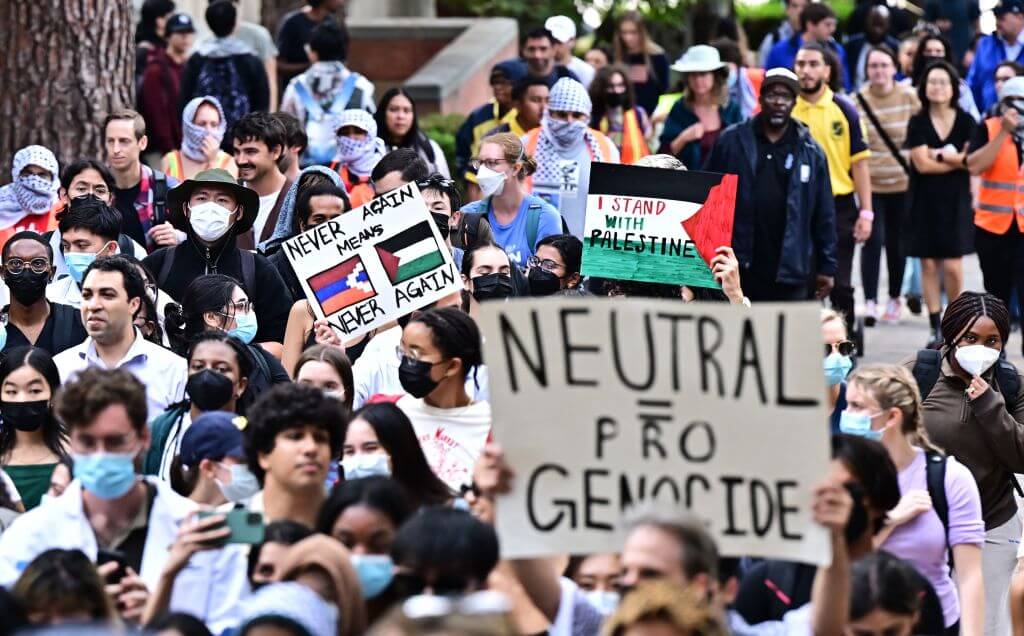UCLA can’t let protesters block Jewish students’ access to campus, judge rules
The injunction was a significant step in legal proceedings over post-Oct. 7 campus encampments

Students participate in a “Walkout to fight Genocide and Free Palestine” at Bruin Plaza at UCLA Oct. 25. Photo by Frederic J. Brown/AFP via Getty Images
A federal judge ordered UCLA to take action against encampments that block access to pro-Israel students, accepting the Jewish students’ claim that doing so violated their religious beliefs.
Issuing a preliminary injunction against the university, Judge Mark Scarsi slammed its handling of the pro-Palestinian encampment that UCLA students erected on campus in April.
“Jewish students were excluded from portions of the UCLA campus because they refused to denounce their faith,” Scarsi wrote. “This fact is so unimaginable and so abhorrent to our constitutional guarantee of religious freedom that it bears repeating.”
The encampment on UCLA’s Royce Quad became a national flashpoint as similar demonstrations began appearing on college campuses around the country in April. Unlike deans at other universities who quickly called in law enforcement to dismantle them, UCLA Chancellor Gene Block at first allowed the encampment to stand, and campus security was placed at its perimeter to de-escalate any confrontations with counter-protesters.
Over the course of a week, the encampment expanded to occupy the entire quad, with encampment leaders setting up wood and steel barriers around them and permitting entry only to members who had been issued wristbands. Because the quad abuts Powell Library — the largest undergraduate library on campus — students without wristbands were blocked from its main entrance.
Police dismantled the encampment May 2, a day after a group of pro-Israel agitators attacked it by lobbing fireworks, poles and other objects into it.
In the lawsuit, three Jewish students said encampment leaders demanded they disavow Israel and Zionism to be let through. When they refused, they were denied entry.
One of the plaintiffs, Yitzchok Frankel, said in the lawsuit that as an Orthodox Jew, Jewish law required Zionist beliefs and prohibited him from disavowing Israel. He referred to the opinion of Rabbi Eliezer Melamed, a contemporaryreligious-Zionist compiler of Jewish law, that one may not speak ill of Israel, as well as an opinion in the Talmud that the Jewish people were punished in the Hebrew Bible because the Twelve Spies slandered the land of Israel. (You can read the full lawsuit here.)
Judges are not allowed to interrogate the truth of religious claims — only that they are sincerely held, according to Michael Helfand, a professor at Pepperdine School of Law who has written extensively about the intersection of church and state.
“Whether or not it’s true that Judaism requires these things or doesn’t require these things, isn’t an inquiry that judges engage in,” Helfand said.
Scarsi, a member of the Federalist Society who was appointed by former President Trump, demanded the school instruct campus security that it may not aid or participate in any obstruction of access going forward.
The school had sought a different injunction in an Aug. 5 memo to the court, committing to prohibiting any protest that involved camping overnight and taking down any encampment that impeded access to buildings or walkways within 24 hours of being reported.
Under Scarsi’s injunction, however, such encampments would be permitted as long as they allowed all students to pass through them.
Mark Rienzi, president of Becket Law, a firm that specializes in religious liberty cases that represented the plaintiffs, said in a statement Tuesday that UCLA had let “antisemitic thugs terrorize Jews on campus.”
“Today’s ruling says that UCLA’s policy of helping antisemitic activists target Jews is not just morally wrong but a gross constitutional violation,” Rienzi said. “UCLA should stop fighting the Constitution and start protecting Jews on campus.”
Attorneys who represented the university did not respond to a request for comment.













